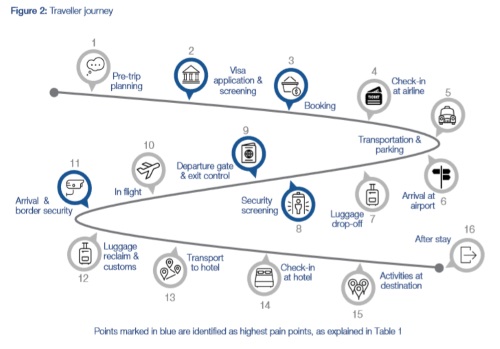
Webinar replay: How digital identity verification will finally make the seamless travel dream come true
By cameron in Uncategorized
Banks, payment providers, and money transfer companies have placed facial and document recognition software at the heart of their digital transformations. The technology replaces legacy processes, such as manually verifying documents, with a fit-for-purpose approach to an increasingly online and mobile world.
Online and mobile are vital in travel’s own digital transformation roadmap. Facial and document recognition is starting to make its presence felt across many travel verticals. The use of facial recognition at airports and as part of the move towards “seamless” travel is only one part of the picture.
As panelist Virginie Vacca Thrane said of her work at Amadeus,
Digital traveler ID is crucial and transformative, as there is a lot of value that we can generate for clients along the entire traveler journey.”
Elsewhere, brands and suppliers which can validate an individual’s identity securely, quickly and accurately early in the booking funnel will benefit from the soft and hard benefits of providing a friction-free customer experience.
And when Apple’s above-the-line campaign for the iPhone X leads with facial recognition as a way to unlock the phone, the travelling public’s expectations around how enterprises validate identities will change accordingly.
Introducing the experts
Our recent webinar on the subject of digital identity verification in travel and hospitality featured a panel of topic experts:
- Steve Craig, director of product and experience at Mitek Systems, one of the world’s leading providers of digital identity verification software to enterprises and sponsor of the webinar.
- Virginie Vacca Thrane is head of traveler identification for Amadeus, working on corporate strategy with a brief to consider not only transformational technologies but also potential synergies across Amadeus’ business units.
- Rajeev Kaul is managing director of Accenture Technology, which is one of the key partners in the World Economic Forum’s Known Traveler Digital Identification initiative. This project aims to use digital technologies – including blockchain – to make international travel easier. Known Traveler is a result of the realisation that the current infrastructure and policy will not be able to support travel’s growth profile – UNWTO forecasts that cross-border travel will increase by 50% over the next decade, hitting 1.8 billion international arrivals by 2030.
Changes to the traveler journey
Steve Craig outlined a typical international travel experience from the perspective of the travelers. He pointed out where digital and mobile-identity verification processes are already taking place, as well as where they might emerge in the not-so-distant future.
Here’s how the journey might look:
On the morning of the trip or before you might have booked with a ride share with an Uber or a Lyft. Chances are that driver will have gone through a digital identity verification process. In time, perhaps the traveller will also need to verify his or her ID to the driver.
When you get to the airport, perhaps the night before you’ve completed an ID verification process by scanning your passport or other ID, so you can use a self-service kiosk, or skip a line.
Once you get to your destination, perhaps you need to hire a car. You can do an ID verification in advance so the rental firm knows it’s you, and seamlessly pick up your vehicle.
In the future, as cars become more connected, when you’ve proven your ID on the mobile perhaps, perhaps the car can unlock itself.
At the hotel, again, there’s a check-in process where the hotel needs to verify your identity. Some countries require passport on file, some need full reporting data on that traveler.
If you decide to stay in an Airbnb, Homeaway, VRBO or any of the sharing economy rental sites, again, you’ll likely need to prove your identity so that the person renting the place knows that it is you. Also, the person renting has likely gone through a digital or mobile identity verification step so the guest feels confident that the place they are renting belongs to the host.
So, lots of different opportunities and I would expect to see in the coming years each of those stages in the traveler’s journey having a digital identity verification process.”
Enhancing the travel value chain
Rajeev and Virginie also touched on the potential use of digital identity verification processes in the travel value chain.
The Known Travel Digital Identity white paper identified 16 touch points within the traveler journey and identified the five most aggravating, one of which is “booking”.

Traveler journey
Rajeev explained further:
Part of how digital identity can help the booking process is the pre-screening of individuals. The [travel value chain] is a continuum, and if we can address some of the downstream steps earlier it can help to streamline the entire process. This is one of the keys to removing friction while adding security.
And when the pre-screening is carried out through digital identity verification, bits of that ID can be transferred to the verifying party well in advance.
Virginie added:
We are seeing [digital identity verification] more and more in travel. Visa waiver scheme, pre-check, vetting, etc, are imposing themselves on travel companies almost as a requirement, but then from this requirement, it is up to the travel companies to leverage this as an opportunity, and there are three dimensions to this.
Firstly, it is about managing the travel growth, secondly around security and thirdly, it is about the digital economy and the capacity to enable more digital services for the traveler.
Learn more about digital ID verification in travel
To hear a recording of the sixty-minute long webinar, which goes into more details on the above and more, please register below.
![]()

